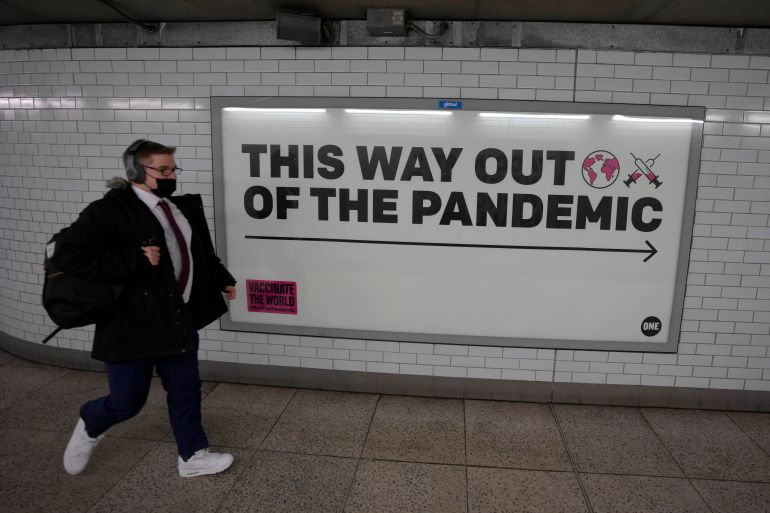What is Disease X and how will pandemic preparations help the world?
WHO Director-General Tedros joined world leaders at the Davos summit to discuss strategies for the next potential pandemic.

As the winter season brings back a surge in respiratory illness and pandemic-era practices such as mask mandates, global health experts are thinking ahead about how to prepare for the next big outbreak.
At the World Economic Forum in Davos, Switzerland, a panel of health industry leaders discussed the importance of preplanning for the outbreak of a hypothetical “Disease X”.
Keep reading
list of 3 itemsHow does the war on Gaza affect mental health of Palestinian children?
Friendship Bench: Zimbabwe doctor turns to grandmothers to treat depression
News of the panel sparked conspiracy from right-wing accounts on social media that world leaders are launching the next pandemic or moving to once again “restrict” free speech and reinstate mask mandates. The WHO has said that such preparation is meant to reduce COVID-19-era devastations such as the insufficient capacity of medical systems or the trillions of dollars that were lost in the economy.
Here’s what we know about Disease X, and what “pandemic preparedness” means.
What is Disease X?
Disease X is not a specific disease but is the name given to a potential novel infectious agent.
It represents an illness which is currently unknown but could pose a serious microbial threat to humans in the future. It is necessary to be prepared because there is a vast reservoir of viruses circulating among wildlife which could become a source of a new infectious disease to which humans do not have immunity.
In 2018, the World Health Organization (WHO) added Disease X to a list of pathogens that are a top priority for research, alongside known killers like Severe Acute Respiratory Syndrome (SARS) and Ebola.
Labelling this potential threat as “Disease X” is meant to prioritise preparations for dealing with a disease that does not yet have vaccines or drug treatments, and could give rise to a severe epidemic.
How much damage could Disease X cause?
The WHO has warned that Disease X could result in 20 times more fatalities than COVID-19.
COVID-19 has killed approximately seven million people around the world. In 2023, healthcare professionals warned that any new pandemic could be even deadlier – killing an estimated 50 million people worldwide.
What was the Disease X panel at Davos?
At the Davos summit on Wednesday, healthcare experts emphasised that preparing for Disease X could help save lives and costs if countries begin research and preemptive measures in advance of a known outbreak.
“Of course, there are some people who say this may create panic. It’s better to anticipate something that may happen because it has happened in our history many times, and prepare for it”, said WHO Director-General Tedros Adhanom Ghebreyesus, who joined the panel.
He said that the WHO has already started implementing measures to prepare for another outbreak. This includes a pandemic fund and a “technology transfer hub” in South Africa that enables the local production of vaccines and would help overcome issues of vaccine inequity across high and low-income countries.
Michel Demare, chair of the board at AstraZeneca, said the company is working to carry out an assessment of health systems across the world to present recommendations for pandemic management.
Preetha Reddy, executive vice chairperson at Apollo Hospitals, pointed to conversations around inequity at the G20 forum, and that using technology to reach rural populations in India is a key focus of current planning.
How do we prepare for a pandemic?
This involves international cooperation, including on research and development, as well as the development of country-level initiatives such as tentative response plans in the event of an outbreak of a new disease.
Such plans could include mapping out how to increase hospital capacity, scale up supply of treatment and adopt new technologies to support medical workers.
The European Centre for Disease Control and Prevention recommends strengthening existing systems instead of developing new ones for a pandemic, and also encourages testing any new systems prior to a new pandemic.
Preparedness also involves increased surveillance of disease to quickly detect any novel pathogens that could turn into a serious threat. Studies show that, on average, at least two new viruses are discovered each year.
Such measures are also expected to dramatically reduce the costs associated with a pandemic, should one occur. While COVID-19 cost the world about $16 trillion, global investments of just $124bn over five years could make the world significantly better prepared for major epidemics in the future, according to a study by the Gates Foundation-backed organisation, Resolve to Save Lives.
What is the response?
The WHO first classified Disease X as a “placeholder” term for a potential deadly virus in 2018.
However, news of the Davos panel sparked a social media firestorm. Right-wing accounts slammed discussions about Disease X, warning that governments could use it to impose policies such as vaccine and mask mandates, while some conspiracy theories suggest governments could even create pandemics themselves.
In a post on X a week before the summit, former Trump administration official Monica Crowley suggested that the panel was signalling the advent of a preplanned disease.
“Just in time for the election, a new contagion to allow them to implement a new WHO treaty, lock down again, restrict free speech and destroy more freedoms”, she wrote.
However, the WHO maintains that the designation of Disease X will allow governments to better cope with a novel pandemic as “worldwide, the number of potential pathogens is very large, while the resources for disease research and development (R&D) is limited”.